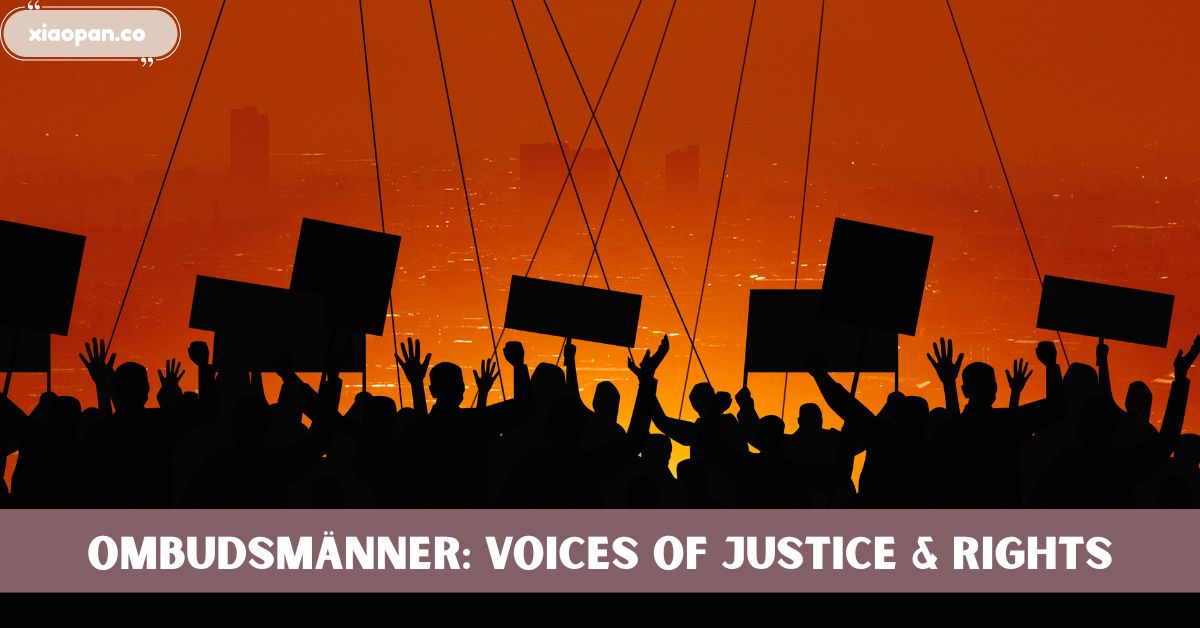Ombudsmänner: Voices of Justice & Rights
In every community, there are those who speak up when others don’t. The advocates who fight for justice and the rights of citizens are called ombudsmänner. They mediate conflicts between individuals and groups, whether those groups be governmental or corporate, using a special combination of advocacy and objectivity.
Over the years, these personalities have undergone considerable change in their role as contemporary watchdogs. They deftly negotiate intricate mechanisms to guarantee that justice is upheld in our everyday encounters. The intriguing world of Ombudsmänner will be explored in this blog article. We will look at their history, duties, impact on justice and rights globally, and the issues they face.
Come along with us as we explore the impact these influential champions have on people’s lives all over the world.
History and evolution of the role
The tradition of the Ombudsmänner may be traced all the way back to the early 1800s in Sweden. In 1809, this position was established by the Swedish Parliament to monitor government acts and protect individuals’ rights.
The model’s initial intent was to promote responsibility among government agencies, but it soon became popular around the world. It was embraced by countries as a means to promote openness and fairness while also successfully addressing issues.
Government oversight was no longer the primary focus as the idea progressed. Ombudsmänner of today work for both for-profit and non-profit entities. From labour disputes to consumer concerns, they now handle it all.
The increasing need for fairness and representation across all areas of society is mirrored in this change. Their position has evolved throughout the years to keep up with changing difficulties, all the while staying true to their original goals of advocacy and objectivity.
The duties and responsibilities of an Ombudsmänner
In the fight for justice and the protection of rights, ombudsmänner are vital. They are primarily responsible for looking into citizen complaints about businesses, nonprofits, or government agencies.
They ensure that problems are addressed fairly and honestly by acting as neutral mediators. In order to do this, it is necessary to collect evidence, interview pertinent parties, and analyse policies.
Procedure and process guidance is another important duty. Ombudsmänner assist the general public in understanding and exercising their rights throughout various systems.
On top of that, they frequently suggest adjustments to make institutions more equitable and accountable. Contributing to the creation of more equal environments, they detect patterns of wrongdoing or systemic difficulties.
By representing the public interest, an Ombudsmann works to find fair solutions that treat everyone with the respect and dignity they deserve.
You May Like : Prosecchini: The Trendy Italian-Inspired Dish Everyone Loves
Types of Ombudsmänner (Government, Corporate, Non-profit)
Ombudsmänner exist in a wide variety of forms, each of which is essential in its own particular field.
Protecting the rights of citizens is an important responsibility of government ombudsmänner. To guarantee openness and responsibility, they look into grievances lodged against public officials. Democracy is strengthened by their existence.
An organization’s internal conflicts are the primary emphasis of a corporate ombudsman. They are there to listen to complaints from workers and do their best to keep the office environment positive. Employees may feel more invested in their work and happier overall as a result.
Ombudsmänner from nonprofits fight for marginalised groups and make sure their opinions are heard. Concerns like prejudice and lack of access to services are areas in which they collaborate closely with local communities. At the local level, their actions frequently result in significant transformation.
While each ombudsman role presents unique obstacles, they all work towards the same overarching objective: ensuring that all members of society have access to justice and safeguarding their rights.
How Ombudsmänner serve as a voice for justice and rights
When it comes to fighting for fairness and safeguarding rights, ombudsmänner are crucial. To make sure people’s complaints are heard, they mediate between people and institutions.
By looking into complaints, they bring attention to injustices that could otherwise go unrecognised. Because of their objectivity, communities learn to trust them.
In many cases, these champions give a voice to under-represented communities that would otherwise have none. Helping people understand and work within complicated processes is a key component of empowerment.
Organisations are held accountable by Ombudsmänner, who are committed to transparency. This kind of pressure promotes ethical behaviour in all industries and leads to better practices overall.
More than that, by pointing out systemic problems, they greatly aid in the revision of policies. With their help, we can make improvements that will benefit all citizens in terms of accessibility and justice.
Ombudsmänner educate and inform the public about their rights as individuals so that they can stand up for themselves in legal matters.
Impact and success stories of Ombudsmänner around the world
Around the world, ombudsmänner have been instrumental in advancing justice and safeguarding rights. Their impact is felt strongly in communities all across the world, from Sweden to South Africa.
The involvement of the Ombudsman in Finland’s fight for children’s rights was important. They began reforms that raised the bar for care for at-risk youngsters by fixing structural problems inside child welfare agencies.
At the same time, concerns about the openness of the government were addressed by the Ombudsman’s office in New Zealand. As a result of their findings, policies were revised to make government employees more answerable.
Veterans in Canada were able to get the help they needed quickly because the federal Ombudsman was able to mediate disputes over their entitlements. A key takeaway from this intervention is the significance of open lines of communication between the government and veterans.
Ombudsmänner are strong agents of change, as these cases show. They speak up for marginalised groups and fight against systems that limit equality and justice. Their crucial significance in promoting equity on a global scale is underscored by each success story.
Challenges faced by Ombudsmänner and how they overcome them
Ombudsmänner frequently traverse a treacherous terrain rife with challenges. The scarcity of resources is a major obstacle. Due to financial constraints, many are unable to adequately respond to customer concerns.
Organisational opposition is another obstacle. Investigations might be slowed down and outcomes can be prolonged when some institutions are hesitant to cooperate. The ability to negotiate and show tact is essential for ombudsmänner in their pursuit of openness.
Their efficacy is also affected by how the public perceives them. Citizens may develop scepticism if they misunderstand their authority. In order to establish trust in communities, education and outreach are crucial.
Many Ombudsmänner work to overcome these obstacles by promoting cross-sector collaboration. They foster settings that are good for talking and solving problems by involving stakeholders early on.
In addition, utilising technology allows for the simplification of procedures and the extension of reach. People in need of assistance or direction with matters pertaining to their rights are able to more easily obtain these services, and they are able to communicate more effectively thanks to digital platforms.
Conclusion
In many different fields, ombudsmänner are vital in maintaining justice and defending rights. By being there, people are able to express their grievances, ask for help, and make institutions answer for their actions. Their one-of-a-kind combination of advocacy and mediation helps make otherwise faceless systems more approachable and trustworthy.
The increasing need for justice and equality in society is mirrored in the development of the ombudsmann concept. These individuals are essential in a dynamic environment because they can adjust to the requirements of those they serve, whether it’s in a government agency or a corporation.
Although there are obstacles, such as political pressures or limited resources, many ombudsmänner overcome them with perseverance. As a result of their effective campaigns and unflinching commitment, they remain global champions for justice.
The importance of ombudsmänner in encouraging responsibility and giving everyone a say is only going to grow in the years to come. Any success story, no matter how big or little, can serve as a reminder that everyone should be treated fairly. Every case that an ombudsmann takes on serves to strengthen the conviction that justice should not be out of reach for everyone, but rather an attainable goal with unfaltering backing.
Read More : Timeless Charm бишкоти ди прато: Italy’s Classic Biscotti







